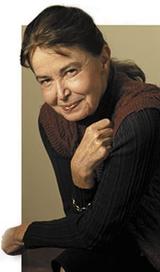Elisabeth Vrba
Professor of Geology and Geophysics
 Elisabeth Vrba, B.Sc., Ph.D. University of Capetown, faculty member at Yale since 1986, you are a trailblazer. One of the first women to be tenured in the Physical Sciences at Yale, you were trained in Mathematics and Statistics at Capetown and always knew you were going to be some kind of scientist, but your career has evolved to be one of great breadth. One of your theories proposes that species that are considered “generalists” are more likely to survive a mass extinction event than “specialist” species because they are able to adapt and survive in the rapidly changing environment. Perhaps this helps explain the success of your own career, where you have, with clear intention, through time and change, refused to be categorized, and where your boundary crossing work has spanned paleontology, ecology, geology, climatology, and the environmental influences on human evolution.
Elisabeth Vrba, B.Sc., Ph.D. University of Capetown, faculty member at Yale since 1986, you are a trailblazer. One of the first women to be tenured in the Physical Sciences at Yale, you were trained in Mathematics and Statistics at Capetown and always knew you were going to be some kind of scientist, but your career has evolved to be one of great breadth. One of your theories proposes that species that are considered “generalists” are more likely to survive a mass extinction event than “specialist” species because they are able to adapt and survive in the rapidly changing environment. Perhaps this helps explain the success of your own career, where you have, with clear intention, through time and change, refused to be categorized, and where your boundary crossing work has spanned paleontology, ecology, geology, climatology, and the environmental influences on human evolution.
You ask fundamental questions: How do new species originate? How does new organismal form and function evolve? How do the evolutionary changes relate to climatic changes? Your famous turnover-pulse hypothesis, based on your work on antelopes, has informed debates about changes in biodiversity and the evolution of our own species. Your research on the Pliocene of Africa showed that long periods of stability followed by major environmental disruption resulted in rapid faunal replacement effected by both extinction and speciation. This recognition that changes to drier conditions provided an explanation for the diversification of hominids on the African savannas 2.5 to 3 million years ago has informed our understanding of the origin of Homo.
Together, you and the late Stephen Gould coined the now widely used term word “exaptation” for features that evolved for one function and were later adapted for another, a classic example of which is the evolution of feathers for insulation and their later use for flight. Indeed Stephen Jay Gould’s magnum opus on The Structure of Evolutionary Theory is dedicated to you and Niles Eldredge in recognition and homage of your major research contribution on the role of physical environment in speciation.
You used your work on African antelopes and their relatives and macroevolution to inspire a generation of students, teaching courses on paleontology and evolutionary theory. You served as the second Director of the Yale Institute for Biospheric Studies succeeding Leo Buss, and for twenty years directed the YIBS ECOSAVE Center that focused on rare and endangered animals. Your office with its spectacular skulls and other specimens adorning the walls has created a fitting venue for stimulating graduate seminars. Asked to offer advice to students beginning a career in the life sciences you stated that the most important thing is to love what you do so you can give yourself wholly over to it. Clearly, you have loved what you have done, and given yourself wholly to it, and your colleagues, who feel lucky and grateful to have benefited from your imagination, tenacity, insight and integrity, salute you as you retire from teaching—but never from your work.
Tribute Editor: Penelope Laurans